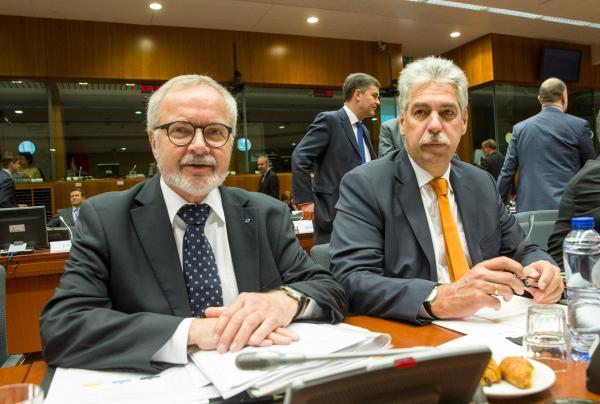
EIB financing in 2015 catalysed private investment totalling around EUR 230 billion, with projects under Investment Plan for Europe mobilising EUR 100 billion so far
President Hoyer: “Strong pipeline for EFSI supported projects for the next two years”
European finance ministers today highlighted the importance of the Investment Plan for Europe in supporting economic growth, job creation and competitiveness across Europe. The ministers, meeting as the Governors of the European Investment Bank, welcomed the commitment of the EIB Group in delivering on the Investment Plan for Europe. So far the EIB Group, comprising the European Investment Bank (EIB) and the European Investment Fund (EIF), has approved 249 transactions which are supported by the European Fund for Strategic Investment (EFSI). EFSI is a guarantee facility from EU budget, which is managed by the EIB as one of three pillars of the Investment Plan for Europe.
Speaking at the annual meeting of the EU Bank, EIB President Werner Hoyer said: “We expect that our financing supported by the EU budget guarantee so far will mobilise 100 billion euros of total investment. This is a remarkable success in less than 12 months”. The President also said he is confident that EIB Group will reach the Investment Plan for Europe’s overall objective of 315 billion Euros investments within the foreseen period of three years: “We have a strong pipeline of projects for the next two years, which will be supported by the EIB under EFSI. The guarantee facility is a great opportunity for the EIB Group to support the European economy and strengthen the EU’s competitiveness through smart infrastructure projects, innovative private sector ventures, and the reduction of risk involved in viable projects, ensuring the cash available in Europe is put to work.”
The EU budget guarantee established under the Investment Plan for Europe allows EIB and EIF to help overcome the current investment gap in the EU by catalysing private financing through transactions with a higher risk profile than regular activities.
President Hoyer also underlined that the Investment Plan for Europe goes beyond EFSI. The European Investment Advisory Hub, the second pillar of the Plan, is now delivering valuable advice to make projects attractive for investors throughout Europe. The Plan’s third pillar is addressing barriers to investment in Europa. President Hoyer recalled that the EIB is not in the lead on this, but can help as a strategic partner: “The EIB Group has considerable market-based expertise in identifying barriers to investment at EU, national and local level. We are ready to step up our contribution and provide further input to the work of Member States and the European Commission.”
Speaking to the EIB Governors, the President also discussed the EIB´s activities in 2015. EIB financing totalled EUR 77.4 billion, with the European Investment Fund accounting for an additional EUR 7 billion. The EIB supported 462 projects inside and outside the EU. This new lending in 2015 allowed the EU Bank to mobilise almost 230 billion euro of additional private investment in 12 months.
Regarding the Bank’s activities outside the European Union President Hoyer said that the EIB is prepared to step up its engagement: ”We are now facing global challenges where the EU response is more needed than ever. This is about achieving the Sustainable Development Goals, addressing the global migration challenge and the current refugee crisis with particular attention to its root causes. and it is about the COP 21 climate targets, where the EIB, the world’s biggest provider of climate finance, recognises it has a special responsibility. To meet these global challenges and promote European interests we need to mobilise significant funds, especially private investment. The EIB is well placed and prepared to contribute, given our track record and global experience.”
He stressed that any additional activity of the EIB outside the Union would not be at the expense of the Bank´s activities within the EU. Additional investment should be generated following the approach of EFSI, which builds on a paradigm shift in using public resources not as subsidies and grants, but as collateral for loans and financial instruments. “Global developments clearly put investment at the forefront of the development agenda, and finance as a key factor for development and growth. The use of financial instruments, backed by guarantees, will maximise impact, catalyse private sector investors and improve the speed and efficiency of scarce public resources. The right mix of financial instruments and grants will result in greater EU impact beyond its borders”, the President emphasised.
Paweł Szałamacha, Finance Minister of Poland, took over as new Chairman of the European Investment Bank’s Board of Governors. He replaces Austrian Finance Minister Hans-Jörg Schelling, following completion of his 12 month mandate. The President said: “I am looking forward to working with Pawel in these challenging times.” He also thanked Hans-Jörg Schelling for a very close and constructive cooperation during the last year.

Photographer: EIB ©The European Union
Download original

Photographer: EIB ©The European Union
Download original

Photographer: EIB ©The European Union
Download original

Photographer: EIB ©The European Union
Download original

Photographer: EIB ©The European Union
Download original

Photographer: EIB ©The European Union
Download original

Photographer: EIB ©The European Union
Download original

Photographer: EIB ©The European Union
Download original

Photographer: EIB ©The European Union
Download original

Photographer: EIB ©The European Union
Download original

Photographer: EIB ©The European Union
Download original

Photographer: EIB ©The European Union
Download original

Photographer: EIB ©The European Union
Download original